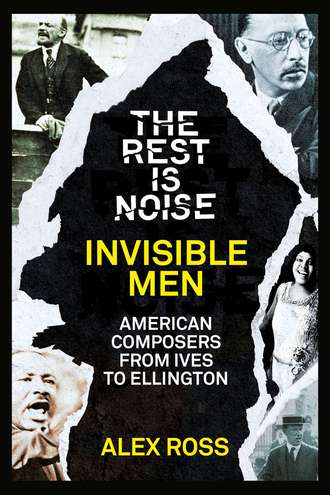
Полная версия
The Rest Is Noise Series: Invisible Men: American Composers from Ives to Ellington
Charles Ives was one such stubborn youth. He came from a distinguished New England family, the descendant of a farmer who arrived in Connecticut fifteen years after the voyage of the Mayflower. His grand parents George White Ives and Sarah Hotchkiss Wilcox Ives had connections to the Transcendentalists, the royalty of American intellectual life; Emerson himself supposedly once spent a night in their Danbury house. Ives’s father was the bandleader George Ives, about whom little is known beyond Charles’s not always reliable recollections. Whether the father really anticipated the son’s experiments is impossible to determine, but one famous tale is corroborated by eyewitness testimony: the bandleader once marched two bands past each other for the simple joy of hearing them in cacophonous simultaneity. Ives also remembers that he and his brothers were directed to sing Stephen Foster’s plantation tune “Old Folks at Home” in the key of E-flat while George played the accompaniment in C.
Charles attended Yale College, where he studied composition with Horatio Parker, under whose tutelage he produced an expert, Dvořákian four-movement symphony. In 1898 the young composer went to New York, where he worked a day job at the Mutual Life Insurance Company and played the organ and directed music at the Central Presbyterian Church. (He had been an expert organist since his teens, using the instrument to experiment with spatial effects and multiple layers of activity.) In 1902 Ives attracted positive attention with a cantata titled The Celestial Country. The Musical Courier detected “undoubted earnestness in study and talent for composition”; the Times called the new work “scholarly and well made,” “spirited and melodious.” Ives seemed poised for a distinguished career. First he would study with an important name in Europe, then he would find a position on an Ivy League faculty.
Just one week after the successful premiere, however, Ives suddenly resigned his church position, and subsequently vanished from the musical scene. Why he did so remains a mystery. Perhaps he had been expecting a more ecstatic reception to his debut; tellingly, he later scrawled the words “Damn rot and worse” over one of the reviews of The Celestial Country. Biographers have added speculation that this athletic young male, Yale’s “Dasher” Ives, had a sort of macho hang-up with respect to American classical-music culture, which, to his eyes, appeared to be an “emasculated art,” controlled by women patrons, effeminate men, and fashionable foreigners (“pussies,” “sissies,” “pansies,” and so on). More prosaically, Ives may have lost faith when an acquaintance was picked to teach at Yale as Parker’s heir apparent.
Instead, Ives chose to make his living in life insurance, at which he proved remarkably adept. He was a proponent of the hard sell, skilled at getting people to buy policies that they didn’t know they wanted. He didn’t go door-to-door himself; his job was to think up sales techniques that could be passed along to a network of freelance brokers. Ives codified his innovations in the pamphlet The Amount to Carry, which laid out a sales pitch “simple enough to be understood by the many, and complex enough to be of some value to all!” Ives told each salesman to plant himself firmly in front of a potential customer’s door and “knock some BIG ideas into his mind.”
Конец ознакомительного фрагмента.
Текст предоставлен ООО «ЛитРес».
Прочитайте эту книгу целиком, купив полную легальную версию на ЛитРес.
Безопасно оплатить книгу можно банковской картой Visa, MasterCard, Maestro, со счета мобильного телефона, с платежного терминала, в салоне МТС или Связной, через PayPal, WebMoney, Яндекс.Деньги, QIWI Кошелек, бонусными картами или другим удобным Вам способом.









